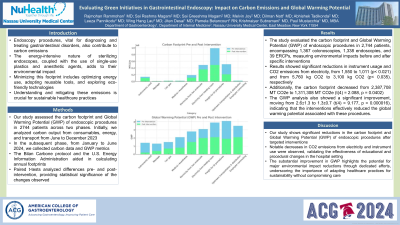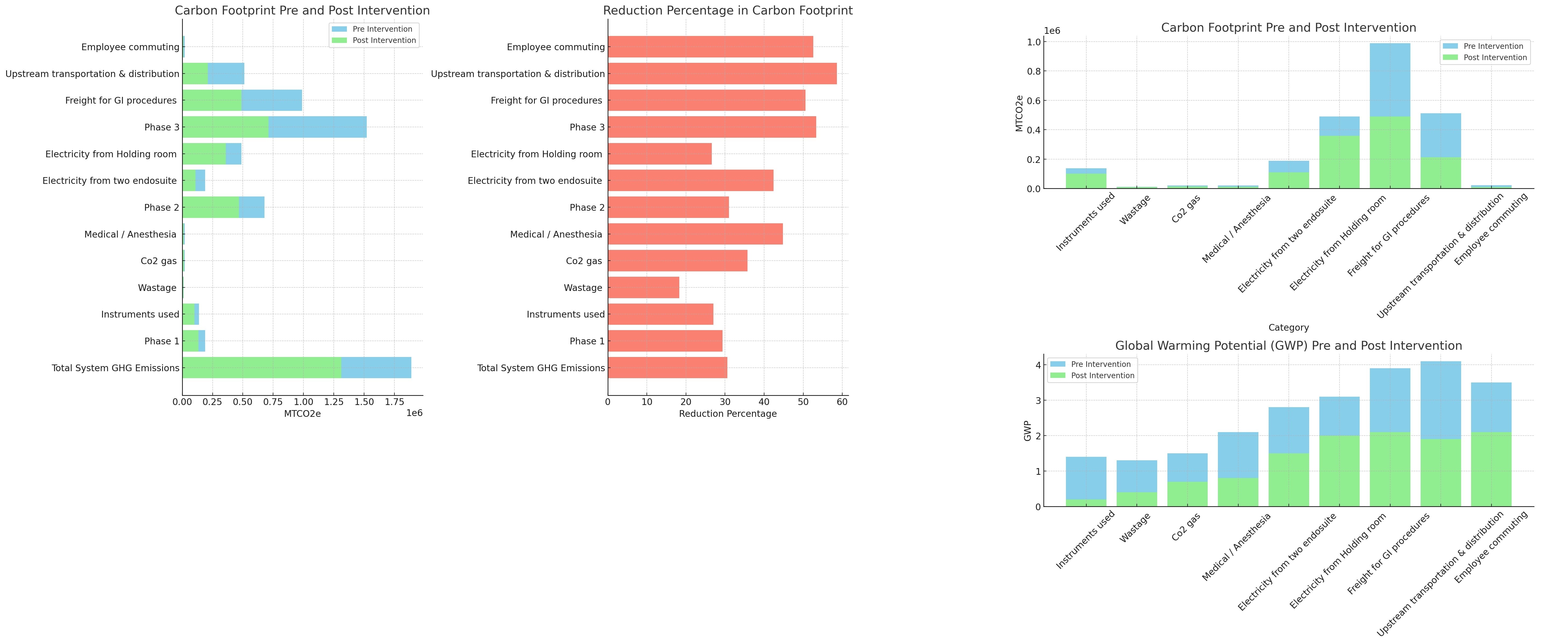Sunday Poster Session
Category: General Endoscopy
P0663 - Evaluating Green Initiatives in Gastrointestinal Endoscopy: Impact on Carbon Emissions and Global Warming Potential
Sunday, October 27, 2024
3:30 PM - 7:00 PM ET
Location: Exhibit Hall E

- RR
Rajmohan Rammohan, MD
Nassau University Medical Center
East Meadow, NY
Presenting Author(s)
Raj Mohan Ram Mohan, MD, Sai Reshma Magam, MD, Sai Greeshma Magam, MD, Melvin Joy, MD, Dilman Natt, MD, Abhishek Tadikonda, MD, Leeza Pannikodu, MD, Winghang Lau, MD, Jiten Desai, MD, Pamela Betancourt, MD, Krishnaiyer Subramani, MD, Paul Mustacchia, MD, MBA
Nassau University Medical Center, East Meadow, NY
Introduction: Endoscopy procedures, vital for diagnosing and treating gastrointestinal disorders, also contribute to carbon emissions. The energy-intensive nature of sterilizing endoscopes, coupled with the use of single-use plastics and anesthetic agents, adds to their environmental impact. Minimizing this footprint includes optimizing energy use, adopting reusable tools, and exploring eco-friendly technologies. Understanding and mitigating these emissions is crucial for sustainable healthcare practices.
Methods: Our study assessed the carbon footprint and Global Warming Potential (GWP) of endoscopic procedures in 2744 patients across two phases. Initially, we analyzed carbon output from consumables, energy, and transport from June to December 2023. Staff received training on reducing environmental impact. In the subsequent phase, from January to June 2024, we collected carbon data and GWP metrics. The Bilan Carbone protocol and the U.S. Energy Information Administration aided in calculating annual footprints. Paired t-tests analyzed differences pre- and post-intervention, providing statistical significance of the changes observed
Results: The study evaluated the carbon footprint and Global Warming Potential (GWP) of endoscopic procedures in 2,744 patients, encompassing 1,367 colonoscopies, 1,338 endoscopies, and 39 ERCPs, measuring environmental impacts before and after specific interventions. Results showed significant reductions in instrument usage and CO2 emissions from electricity, from 1,550 to 1,011 (p< 0.021) and from 5,760 kg CO2 to 3,100 kg CO2 (p< 0.035), respectively. Additionally, the carbon footprint decreased from 2,387,708 MT CO2e to 1,311,308 MT CO2e (t(4) = 2.088, p = 0.0402). The GWP analysis also showed a significant improvement, moving from 2.6±1.3 to 1.3±0.7 (t(4) = 9.177, p = 0.000016), indicating that the interventions effectively reduced the global warming potential associated with these procedures.
Discussion: Our study shows significant reductions in the carbon footprint and Global Warming Potential (GWP) of endoscopic procedures after targeted interventions. Notable decreases in CO2 emissions from electricity and instrument use were observed, validating the effectiveness of educational and procedural changes in the hospital setting. The substantial improvement in GWP highlights the potential for major environmental impact reductions through dedicated efforts, underscoring the importance of adapting healthcare practices for sustainability without compromising care.

Note: The table for this abstract can be viewed in the ePoster Gallery section of the ACG 2024 ePoster Site or in The American Journal of Gastroenterology's abstract supplement issue, both of which will be available starting October 27, 2024.
Disclosures:
Raj Mohan Ram Mohan, MD, Sai Reshma Magam, MD, Sai Greeshma Magam, MD, Melvin Joy, MD, Dilman Natt, MD, Abhishek Tadikonda, MD, Leeza Pannikodu, MD, Winghang Lau, MD, Jiten Desai, MD, Pamela Betancourt, MD, Krishnaiyer Subramani, MD, Paul Mustacchia, MD, MBA. P0663 - Evaluating Green Initiatives in Gastrointestinal Endoscopy: Impact on Carbon Emissions and Global Warming Potential, ACG 2024 Annual Scientific Meeting Abstracts. Philadelphia, PA: American College of Gastroenterology.
Nassau University Medical Center, East Meadow, NY
Introduction: Endoscopy procedures, vital for diagnosing and treating gastrointestinal disorders, also contribute to carbon emissions. The energy-intensive nature of sterilizing endoscopes, coupled with the use of single-use plastics and anesthetic agents, adds to their environmental impact. Minimizing this footprint includes optimizing energy use, adopting reusable tools, and exploring eco-friendly technologies. Understanding and mitigating these emissions is crucial for sustainable healthcare practices.
Methods: Our study assessed the carbon footprint and Global Warming Potential (GWP) of endoscopic procedures in 2744 patients across two phases. Initially, we analyzed carbon output from consumables, energy, and transport from June to December 2023. Staff received training on reducing environmental impact. In the subsequent phase, from January to June 2024, we collected carbon data and GWP metrics. The Bilan Carbone protocol and the U.S. Energy Information Administration aided in calculating annual footprints. Paired t-tests analyzed differences pre- and post-intervention, providing statistical significance of the changes observed
Results: The study evaluated the carbon footprint and Global Warming Potential (GWP) of endoscopic procedures in 2,744 patients, encompassing 1,367 colonoscopies, 1,338 endoscopies, and 39 ERCPs, measuring environmental impacts before and after specific interventions. Results showed significant reductions in instrument usage and CO2 emissions from electricity, from 1,550 to 1,011 (p< 0.021) and from 5,760 kg CO2 to 3,100 kg CO2 (p< 0.035), respectively. Additionally, the carbon footprint decreased from 2,387,708 MT CO2e to 1,311,308 MT CO2e (t(4) = 2.088, p = 0.0402). The GWP analysis also showed a significant improvement, moving from 2.6±1.3 to 1.3±0.7 (t(4) = 9.177, p = 0.000016), indicating that the interventions effectively reduced the global warming potential associated with these procedures.
Discussion: Our study shows significant reductions in the carbon footprint and Global Warming Potential (GWP) of endoscopic procedures after targeted interventions. Notable decreases in CO2 emissions from electricity and instrument use were observed, validating the effectiveness of educational and procedural changes in the hospital setting. The substantial improvement in GWP highlights the potential for major environmental impact reductions through dedicated efforts, underscoring the importance of adapting healthcare practices for sustainability without compromising care.

Figure: Carbon footprint and Global warming potential from GI procedures
Note: The table for this abstract can be viewed in the ePoster Gallery section of the ACG 2024 ePoster Site or in The American Journal of Gastroenterology's abstract supplement issue, both of which will be available starting October 27, 2024.
Disclosures:
Raj Mohan Ram Mohan indicated no relevant financial relationships.
Sai Reshma Magam indicated no relevant financial relationships.
Sai Greeshma Magam indicated no relevant financial relationships.
Melvin Joy indicated no relevant financial relationships.
Dilman Natt indicated no relevant financial relationships.
Abhishek Tadikonda indicated no relevant financial relationships.
Leeza Pannikodu indicated no relevant financial relationships.
Winghang Lau indicated no relevant financial relationships.
Jiten Desai indicated no relevant financial relationships.
Pamela Betancourt indicated no relevant financial relationships.
Krishnaiyer Subramani indicated no relevant financial relationships.
Paul Mustacchia indicated no relevant financial relationships.
Raj Mohan Ram Mohan, MD, Sai Reshma Magam, MD, Sai Greeshma Magam, MD, Melvin Joy, MD, Dilman Natt, MD, Abhishek Tadikonda, MD, Leeza Pannikodu, MD, Winghang Lau, MD, Jiten Desai, MD, Pamela Betancourt, MD, Krishnaiyer Subramani, MD, Paul Mustacchia, MD, MBA. P0663 - Evaluating Green Initiatives in Gastrointestinal Endoscopy: Impact on Carbon Emissions and Global Warming Potential, ACG 2024 Annual Scientific Meeting Abstracts. Philadelphia, PA: American College of Gastroenterology.
